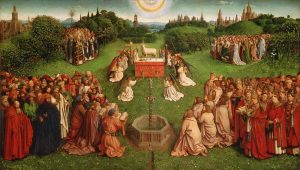A Christmas Study
When the angel Gabriel came to visit Mary to announce to her that God had chosen her to become the mother of His Son, Mary almost certainly had many questions, but she asked just one. Here is Luke’s account, from Luke 1:26-38:
26 Now in the sixth month [of Elizabeth’s pregnancy] the angel Gabriel was sent by God to a city of Galilee named Nazareth, 27 to a virgin betrothed to a man whose name was Joseph, of the house of David. The virgin’s name was Mary. 28 And having come in, the angel said to her, “Rejoice, highly favored one, the Lord is with you; blessed are you among women!”
29 But when she saw him, she was troubled at his saying, and considered what manner of greeting this was. 30 Then the angel said to her, “Do not be afraid, Mary, for you have found favor with God. 31 And behold, you will conceive in your womb and bring forth a Son, and shall call His name Jesus. 32 He will be great, and will be called the Son of the Highest; and the Lord God will give Him the throne of His father David. 33 And He will reign over the house of Jacob forever, and of His kingdom there will be no end.”
34 Then Mary said to the angel, “How can this be, since I do not know a man?”
35 And the angel answered and said to her, “The Holy Spirit will come upon you, and the power of the Highest will overshadow you; therefore, also, that Holy One who is to be born will be called the Son of God. 36 Now indeed, Elizabeth your relative has also conceived a son in her old age; and this is now the sixth month for her who was called barren. 37 For with God nothing will be impossible.”

38 Then Mary said, “Behold the maidservant of the Lord! Let it be to me according to your word.” And the angel departed from her.
No Biological Father
How, indeed? This was a once-in-history experience, a reality so rare that the vast majority of people, even many well-intentioned people, never would understand. Mary knew this. Yet, upon hearing the answer Gabriel gave her, she willingly submitted to God’s will. Dr. Bill Bright writes,
What was Mary’s reaction to this astounding news? Her response shows why God selected her to carry the Christ child….
Most likely Mary understood part of what her role in this miraculous plan would cost her. She lived in a tight community that would be aghast when it learned Mary was pregnant before she was married. What would Joseph think? Would he refuse to marry her, thinking that she had been unfaithful to him? But she considered those problems small compared to the joy of obeying God.1
Of course, when Joseph learned that Mary was pregnant, he was devastated. Yet the Bible tells us in Matthew 1:18-23,

18 Now the birth of Jesus Christ was as follows: After His mother Mary was betrothed to Joseph, before they came together, she was found with child of the Holy Spirit. 19 Then Joseph her husband, being a just man, and not wanting to [humiliate her or] make her a public example, was minded to put her away secretly. 20 But while he thought about these things, behold, an angel of the Lord appeared to him in a dream, saying, “Joseph, son of David, do not be afraid to take to you Mary your wife, for that which is conceived in her is of the Holy Spirit. 21 And she will bring forth a Son, and you shall call His name Jesus, for He will save His people from their sins.”
22 So all this was done that it might be fulfilled which was spoken by the Lord through the prophet, saying: 23 “Behold, the virgin shall be with child, and bear a Son, and they shall call His name Immanuel,” which is translated, “God with us.”
What? God with us? In a situation in which He and those involved directly in His plan would be so quickly and thoroughly misunderstood? Yes, the plan God initiated to bring His Son in to the world included the risk, and in countless numbers of cases the reality, of being radically and tragically misunderstood. In fact. the stigma of an “illegitimate” pregnancy and birth would follow Jesus into adulthood. In John 8:31-42, John recorded this exchange between the Lord and the Pharisees. Thinking they knew everything about God and His law, they actually put their willful ignorance on display. Pay close attention to what the Pharisees said to Jesus in verse 41.
The stigma of an “illegitimate” pregnancy and birth would follow Jesus into adulthood.
8:31 Then Jesus said to those Jews who believed Him, “If you abide in My word, you are My disciples indeed. 32 And you shall know the truth, and the truth shall make you free.”
33 They answered Him, “We are Abraham’s descendants, and have never been in bondage to anyone. How can You say, ‘You will be made free’?”
34 Jesus answered them, “Most assuredly, I say to you, whoever commits sin is a slave of sin. 35 And a slave does not abide in the house forever, but a son abides forever. 36 Therefore if the Son makes you free, you shall be free indeed.
37 “I know that you are Abraham’s descendants, but you seek to kill Me, because My word has no place in you. 38 I speak what I have seen with My Father, and you do what you have seen with your father.”
39 They answered and said to Him, “Abraham is our father.”
Jesus said to them, “If you were Abraham’s children, you would do the works of Abraham. 40 But now you seek to kill Me, a Man who has told you the truth which I heard from God. Abraham did not do this.41 You do the deeds of your father.”
Then they said to Him, “We were not born of fornication; we have one Father—God.”
42 Jesus said to them, “If God were your Father, you would love Me, for I proceeded forth and came from God; nor have I come of Myself, but He sent Me.”
It is both interesting and significant that the Pharisees’ not-so-subtle implication that Jesus’ was conceived illegitimately afforded Him a golden opportunity. He replied, “I proceeded forth and came from God; nor have I come of Myself, but He sent Me.” It also gave Him the opportunity to hit them, appropriately, with a heavy dose of truth they needed desperately to hear:
43 Why do you not understand My speech? Because you are not able to listen to My word. 44 You are of your father the devil, and the desires of your father you want to do. He was a murderer from the beginning, and does not stand in the truth, because there is no truth in him. When he speaks a lie, he speaks from his own resources, for he is a liar and the father of it. 45 But because I tell the truth, you do not believe Me. 46 Which of you convicts Me of sin? And if I tell the truth, why do you not believe Me? 47 He who is of God hears God’s words; therefore you do not hear, because you are not of God.”
God’s Wisdom
No wonder Paul wrote in 1 Corinthians 3:18-20,
18 Let no one deceive himself. If anyone among you seems to be wise in this age, let him become a fool that he may become wise. 19 For the wisdom of this world is foolishness with God. For it is written, “He catches the wise in their owncraftiness”; 20 and again, “The Lord knows the thoughts of the wise, that they are futile.”
Let’s return to Luke’s account of Jesus’ birth to consider another probable misunderstanding. As we reflect on it, we should realize that even in the midst of all the misunderstandings that occurred, God took care of the people involved and saw to it that His plan was fulfilled. Dr. Bill Bright continues,
God made sure that Mary was cared for. When an angel told Joseph God’s plan for Mary, Joseph continued with his plans to marry her. He, too, was willing to obey God.

Then more problems arose. Just when Mary was nearing the time of her delivery, the Roman government ordered all Jewish males to travel to their ancestral home to pay a tax. Imagine what Mary and Joseph must have felt. Now they would be burdened with an added tax and a long trip from Nazareth to Bethlehem, the home of King David, Joseph’s ancestor. The trip must have been a hardship for Mary, who was in her ninth month of pregnancy.2
Born in a Stable
There are more — even many more — ways in which God’s plan set the stage for a great many observers to misunderstand what He was doing. Even so, God knew exactly what He was doing. Consider the humble place where Jesus was born. Luke tells us in Luke 2:6-7,
6 So it was, that while they [Mary, Joseph, and Jesus, who was yet unborn] were there, the days were completed for her to be delivered. 7 And she brought forth her firstborn Son, and wrapped Him in swaddling cloths, and laid Him in a manger, because there was no room for them in the inn.
Jesus, who was God, not only entered the world as a baby (and even then, never ceasing to be God); He also was born in a stable, with animals surrounding Him. Francis and Edith Schaeffer share their insights on this amazing aspect of the Christmas story:

When they arrived in Bethlehem, there was not a single place left at any inn (or hotel) and no one opened their home to them. The only place they found to stay was a stable, where animals live. The smells would be like the smells of any stable, not fresh clean smells; and there were no lovely, soft carpets, nor any beds. Jesus had always lived in heaven, which is far more beautiful and glorious than any palace or garden on earth, yet he left all this to be born in a smelly stable. But do you know something very special? Although a stable does not seem a good place for a king to be born, or even for an ordinary baby to be born, let alone the Son of God to be born, yet it is a perfect place for a lamb to be born. You see, all through the centuries God had said the Messiah would be born in Bethlehem, and that he would be born of a virgin, and all through the centuries it had been made clear that he would be the lamb. God made every detail perfect, because he is perfect in all that he does. God made it very clear, so that people could recognize that this was the One who had been promised through all the years.

So it was in the stable that the little baby was born. Mary wrapped him in swaddling cloths (that is, long pieces of cloth wrapped around and around the baby), and laid him in a manger. A manger is where animals eat, but also where you could easily put a little newborn lamb. There among lambs, the little baby gave his first cry, and breathed air into his lungs just as other newborn babies do.3
Born to Die
Why did Jesus have to be born? Let’s turn to Dr. Bill Bright once again. He reminds us that in being born, Jesus, who was, is, and always has been God, became like us. Jesus did not remain in heaven, where He could be accused of being detached from humanity. No! Instead, choosing to be confined to a human body, He left heaven behind. He left His throne behind. He came to earth to dwell among the people He’d created — so they could come to understand what God is like (John 1:14,18). Having been born, Jesus wasn’t any longer “only that magnificent being sitting on a throne in heaven.” Now “He is also that baby Mary held [holds] in her arms.”4 Ponder it!
Think of what this birth meant for Jesus. He had lived from eternity in heaven, a place of absolute joy and beauty. Angels constantly worshipped him; He had no limitations or pain.
Then He put all that aside to be born as a baby in a stable. Paul describes the sacrifice of Christ’s human birth: “Though He was God, He did not demand and cling to His rights as God. He made Himself nothing; He took the humble position of a slave and appeared in human form” (Philippians 2:6-7, NLT, 1996).5
As mind-blowing as all this is, there’s something even more mind-blowing to realize. Jesus was born to die! Here is Philippians 2:8:
8 And being found in appearance as a man, He humbled Himself and became obedient to the point of death, even the death of the cross.
Yes, the harsh truth is that God’s plan included His own Son’s death. In fact, Jesus’ death, along with His resurrection, was the central — the most important element in God’s plan. In a Christmas sermon in which he describes how that beholding the baby Jesus in the manger — God Himself — transformed the shepherds’ lives, Francis Schaeffer looks beyond the manger to the cross on which Jesus would die to pay the penalty for sinners’ sins. Schaeffer’s insights are so powerful and profound on this matter I am compelled to quote them to you in full.
Why did God come into this world? Only the scriptural answer will suffice: the second person of the Trinity has been born because He loves the world.
But why did He come this way, as a little baby? Why did He choose to lie in a manger and be cared for by a human mother, with the sweetness but the utter weakness of a newborn babe? He came this way because He came to meet the central need of men. He did not come to overthrow the Romans, though a lot of the Jews would have loved that. If He had, He would have come riding on a great conquering steed. The central reason He came was not to raise the living standards of the world. Surely if twentieth-century man were going to vote on the way he would like a messiah to appear, he would want Him loaded down with money-bags from Heaven. He did not come primarily to teach and relieve ignorance — perhaps then He would have come laded with books. An angel had revealed to Joseph the primary task for which He came: “Though shalt call his name JESUS; for he shall save his people from their sins” (Matt. 1:21).

How is Jesus going to fulfill this promise? The fulfillment cannot be separated from Calvary’s cross — from the nails, the hammer, the harshness of such a death. Jesus as the Passover Lamb will complete the promise the Jews affirmed in the Passover for 1,500 years. He is going to save His people by His act of Passover obedience.

When we perceive the simplicity and yet the grandeur of what is involved, we are overwhelmed. The second person of the Trinity lies in the manger for a reason. Because He loves the world, He has come not just to eliminate the peripheral results of man’s fall (though these will be totally removed at His second coming); He is here to cut the nerve of man’s real dilemma, to solve the problem from which all other problems flow. The “condition of man” is not what modern man thinks it is. Man is a sinner who needs an overwhelming love. Jesus has come to save His people from their sins. This is not to say that He has no interested in these other things now, but we must not get the matters reversed — the central thing is central.6

Human Blindness and Foolishness
Keeping “the central thing…central,” God the Father “so loved the world that He gave His only begotten Son, that whoever believes in Him should not perish but have everlasting life. For God did not send His Son into the world to condemn the world, but that the world through Him might be saved” (John 3:16-17). Jesus died a cruel death on a Roman cross that we might have “peace with God” (Rom. 5:1). Because God “made Him who knew no sin to be sin for us,…we” are able to have “the righteousness of God in [and through] Him” (2 Cor. 5:21).
What we indicated before when we cited 1 Cor. 3:18-20, we reiterate here. This is foolishness to many, even most (1 Cor 1:18-25); but it is God’s reality, and God’s reality is reality. In fact, it is God’s wisdom.
Why would God implement a plan to save sinners that so many sinners would, and do, misunderstand?
Why would God implement a plan to save sinners that so many sinners would, and do, misunderstand? I believe the answer can be found in the reply Jesus gave to His disciples after they asked Him why He taught in parables. In Matthew 13:10-17 (read verses 1-30 for the complete context) the Lord indicated that those whose minds have been made up about Him and His mission truly are blind and deaf in the worst ways, but to those with the “doors to their hearts” cracked open, understanding is possible — even an understanding that grows and comprehends more as time goes on.
10 And the disciples came and said to Him, “Why do You speak to them in parables?”
11 He answered and said to them, “Because it has been given to you to know the mysteries of the kingdom of heaven, but to them it has not been given. 12 For whoever has, to him more will be given, and he will have abundance; but whoever does not have, even what he has will be taken away from him. 13 Therefore I speak to them in parables, because seeing they do not see, and hearing they do not hear, nor do they understand. 14 And in them the prophecy of Isaiah is fulfilled, which says:
‘Hearing you will hear and shall not understand,
And seeing you will see and not perceive;
15 For the hearts of this people have grown dull.
Their ears are hard of hearing,
And their eyes they have closed,
Lest they should see with their eyes and hear with their ears,
Lest they should understand with their hearts and turn,
So that I should heal them.’
16 But blessed are your eyes for they see, and your ears for they hear; 17 for assuredly, I say to you that many prophets and righteous men desired to see what you see, and did not see it, and to hear what you hear, and did not hear it.
Takeaways
What are the “takeaways” this Christmas? Consider the following.
-
-
- First, accept that God’s plan is mind-blowing, that it defies conventional wisdom, and that it might appear foolish at first.
- Second, if you don’t know Jesus, receive Him and believe on His name. When you do you God gives you “the right to become” a child “of God.” God gives this right to all “those who believe in His [Jesus’] name.” Those who believe are “born, not of blood, nor of the will of the flesh, nor of the will of man, but of God” (John 1:10-13).
- Third, if you already know Him, thank Him for His counterintuitive plan of salvation, and that you have become a direct beneficiary of that plan and of His redemptive work.
- Fourth, take to heart Philippians 2:5-8:
-
5 Let this mind be in you which was also in Christ Jesus, 6 who, being in the form of God, did not consider it robbery to be equal with God, 7 but made Himself of no reputation, taking the form of a bondservant, and coming in the likeness of men. 8 And being found in appearance as a man, He humbled Himself and became obedient to the point of death, even the death of the cross.

-
-
- Fifth, rejoice that God exonerates all those who embrace His wisdom, despite the reality that the world consistently views it as foolishness. Philippians 2:9-11 tells us of His exalting Christ; certainly in Christ’s exaltation, all of His followers are exonerated (also see 1 Sam. 2:30).
-
9 Therefore God also has highly exalted Him and given Him the name which is above every name, 10 that at the name of Jesus every knee should bow, of those in heaven, and of those on earth, and of those under the earth, 11 and that every tongue should confess that Jesus Christ is Lord, to the glory of God the Father.
-
-
- Finally, marvel at God’s plan of salvation, one that meant His Son would leave heaven to be born in a stable and become the ultimate sacrifice (John 1:29), to die to pay the penalty for your sin, that you might be made right with God.
-
Let’s summarize all we have said in terms of the theme of this post. Here is a primary takeaway: Thank God that He was and is willing to be misunderstood, and to send His Son into the world to be misunderstood, for your sake.
When you get right down to it, this is what Christmas is all about!
Copyright © 2022 by B. Nathaniel Sullivan. All rights reserved.
Unless otherwise indicated, Scripture has been taken from the New King James Version®. Copyright © 1982 by Thomas Nelson, Inc. Used by permission. All rights reserved.
top image credit: Lightstock
Notes:
1Bill Bright, Discover the Real Jesus (Wheaton, IL: Tyndale House Publishers, 2004), 30-31.
2Bill Bright, 31.
3Francis and Edith Schaeffer, Everybody Can Know: Family Devotions from the Gospel of Luke (Wheaton, IL: Tyndale House Publishers, 1984), 30.
4Bill Bright, 33.
5Ibid.
6Francis A. Schaeffer, “What Difference Has Looking Made? (A Christmas Study),” in No Little People, in The Complete Works of Francis A. Schaeffer: A Christian Worldview, Volume 3: A Christian View of Spirituality (Westchester, IL: Crossway Books, 1985), 123-124.
